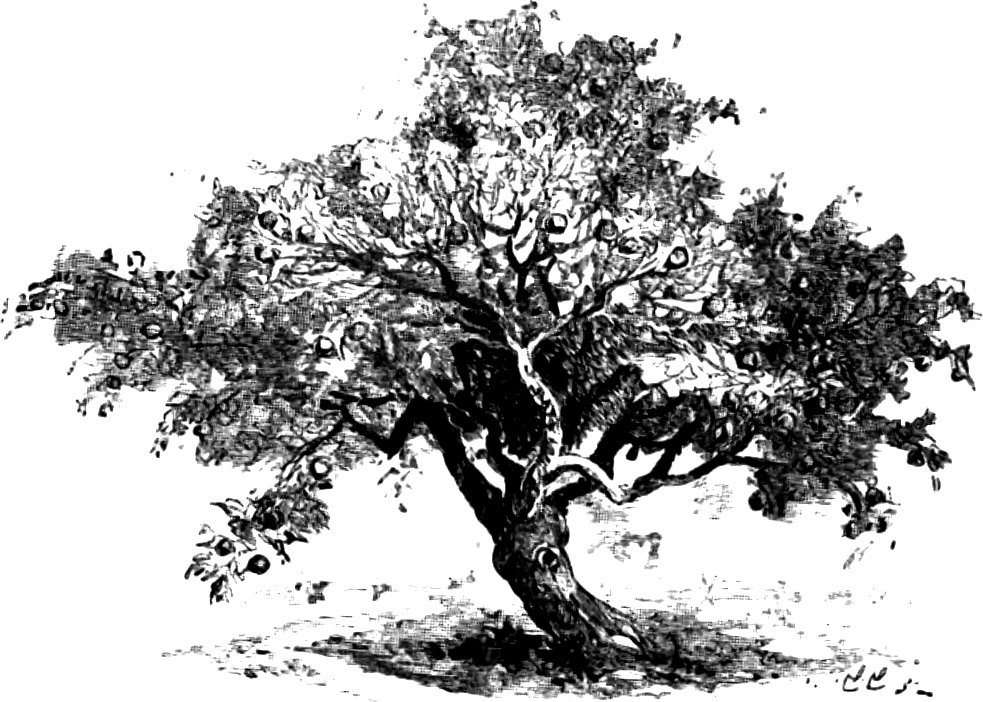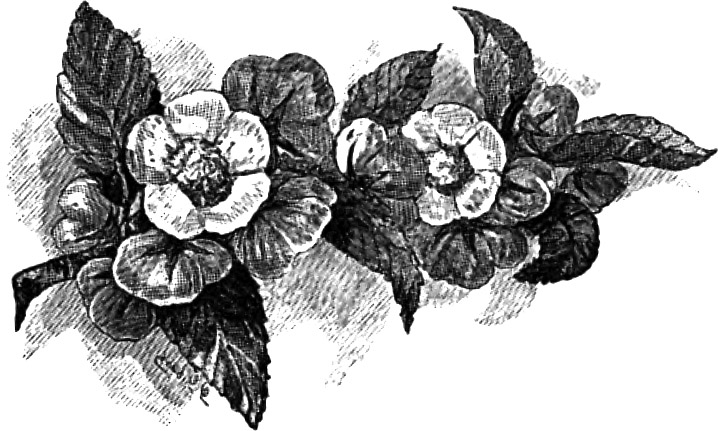St. Nicholas Magazine
Vol. 7, No 8, June 1880.
Apple-seed John.
by Lydia Maria Child

Poor Johnny was bended well nigh double
With years of toil and care and trouble;
But his large old heart still felt the need
Of doing for others some kindly deed.
“But what can I do?” old Johnny said:
“I who work so hard for daily bread?
It takes heaps of money to do much good;
I am far too poor to do as I would.”
The old man sat thinking deeply a while,
Then over his features gleamed a smile,
And he clapped his hands with a childish glee,
And said to himself: “There's a way for me!”
He worked, and he worked with might and main,
But to none the plan in his brain.
He took ripe apples in pay for chores,
And carefully cut from them all the cores.
He filled his bag full, then wandered away,
And no man saw him for many a day.
With knapsack over his shoulder slung,
He marched along, and whistled or sung.
He seemed to roam with no object in view,
Like one who has nothing on earth to do;
But, rambling thus o'er prairies wide,
He paused sometimes, and his bag untied.
With pointed cane deep holes would bore,
And in every hole he placed a core;
Then covered them well, and left them there
In keeping of sunshine, rain, and air.
Sometimes for days he waded through grass,
And saw not a living creature pass;
But often, when sinking to sleep in the dark,
He heard owls hoot and prairie-dogs bark.
Sometimes an Indian of sturdy limb,
Came striding along and walked with him.
And he who had food, shared with the other,
As if he had met a hungry brother.
When the Indian saw how the bag was filled,
And looked at the holes that the white man drilled,
He thought to himself 't was a silly plan
To be planting seed for some future man.
Sometimes a log cabin came in view,
Where Johnny was sure to find jobs to do,
By which he gained stores of bread and meat,
And welcome rest for his weary feet.
He had full many a story to tell,
And goodly hymns that he sung rigth well;
He tossed up the babes, and joined the boys
In many a game full of fun and noise.
And he seemed so hearty, in work or play
Men, women, and boys all urged him to stay;
But he always said, “I have something to do,
And I must go on to carry it through.”
The boys, who were sure to follow him round,
Soon found what it was he put in the ground;
And so, as time passed and he traveled on,
Ev'ry one called him “Apple-Seed John.”
Whenever he'd used the whole of his store,
He went to cities and worked for more;
Then he marched back to the wilds again,
And planted seed in hill-side and plain.
In cities, some said the old man was crazy;
While others said he was only lazy;
But he took no notice of jibes and jeers,
He knew he was working for future years.
He knew that trees would soon abound
Where once a tree could not have been found;
That a flick'ring play of light and shade
Would dance and glimmer along the glade;
That blossoming sprays would form fair bowers,
And sprinkle the grass with rosy showers;
And the little seeds his hands had spread
Would become ripe apples when he was dead.
So he kept on traveling far and wide,
'Till his old limbs failed him, and he died.
He said at the last: “'T is a comfort to feel
I 've done good in the world, though not a great deal.”
Weary travelers, journeying West,
In the shade of his trees find pleasant rest;
And they often start, with glad surprise,
At the rosy fruit that round them lies.
And if they inquire whence came such trees,
Where not a bough once swayed in the breeze,
The answer still comes, as they travel on,
“These trees were planted by Apple-seed John.”

Apple-seed John., by Lydia Maria Child, St. Nicholas Magazine, June 1880, Vol. 7. No. 8, Pages 604-605. (PDF),
Apple-seed John., by Lydia Maria Child, History of Morrow County and Ohio, 1880, by J. H. Battle, W. Henry Perrin, and O. L. Baskin, Pages 222-223. (PDF),
Appleseed John, by Lydia Maria Child, in History of Ashland County, Ohio, by George William Hill, 1880, Page 187. (PDF). This version differs in several ways from the St. Nicholas version.
Apple-seed John, by Lydia Maria Child, Story-Telling Poems by Frances Jenkins Olcott, 1913: (PDF)